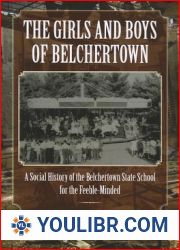
BOOKS - The Girls and Boys of Belchertown: A Social History of the Belchertown State ...

The Girls and Boys of Belchertown: A Social History of the Belchertown State School for the Feeble-Minded
Author: Robert N. Hornick
Year: June 30, 2012
Format: PDF
File size: PDF 12 MB
Language: English
Year: June 30, 2012
Format: PDF
File size: PDF 12 MB
Language: English
During much of the twentieth century, people labeled and "feeble-minded, and " and "mentally deficient, and " and "mentally retarded and " were often confined in large, publicly funded, residential institutions located on the edges of small towns and villages some distance from major population centers. At the peak of their development in the late 1960s, these institutions-frequently called and "schools and " or and "homes and "-housed 190,000 men, women, and children in the United States.The Girls and Boys of Belchertown offers the first detailed history of an American public institution for intellectually disabled persons. Robert Hornick recounts the story of the Belchertown State School in Belchertown, Massachusetts, from its beginnings in the 1920s to its closure in the 1990s following a scandalous expose and unprecedented court case that put the institution under direct supervision of a federal judge. He draws on personal interviews, private letters, and other unpublished sources as well as local newspapers, long out-of-print materials, and government reports to re-create what it was like to live and work at the school. More broadly, he gauges the impact of changing social attitudes toward intellectual disability and examines the relationship that developed over time between the school and the town where it was located.What emerges is a candid and complex portrait of the Belchertown State School that neither vilifies those in charge nor excuses the injustices perpetrated on its residents, but makes clear that despite the court-ordered reforms of its final decades, the institution needed to be closed.
















































